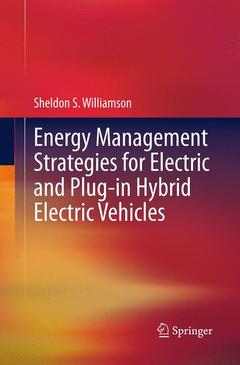Description
Energy Management Strategies for Electric and Plug-in Hybrid Electric Vehicles, Softcover reprint of the original 1st ed. 2013
Author: Williamson Sheldon S.
Language: English
Subjects for Energy Management Strategies for Electric and Plug-in...:
105.49 €
Subject to availability at the publisher.
Add to cartSupport: Print on demand
253 p. · 15.5x23.5 cm · Hardback
Description
/li>Contents
/li>Biography
/li>Comment
/li>
Sheldon S. Williamson received his Bachelor of Engineering (B.E.) degree in Electrical Engineering with high distinction from University of Mumbai, Mumbai, India, in 1999. He received the Master of Science (M.S.) degree in 2002, and the Doctor of Philosophy (Ph.D.) degree (with Honors) in 2006, both in Electrical Engineering, from the Illinois Institute of Technology, Chicago, IL, specializing in automotive power electronics and motor drives, at the Grainger Power Electronics and Motor Drives Laboratory. Dr. Williamson is an Associate Professor within the Department of Electrical and Computer Engineering, at Concordia University, Montreal, Canada, where he has been working since June 2006. His main research interests include the study and analysis of electric drive trains for electric, hybrid electric, plug-in hybrid electric, and fuel cell vehicles. His research interests also include modeling, analysis, design, and control of power electronic converters and motor drives forland, sea, air, and space vehicles, as well as the power electronic interface and control of renewable energy systems.
Dr. Williamson has offered numerous conference tutorials, lectures, and short courses in the areas of Automotive Power Electronics and Motor Drives. He is the principal author/co-author of over 150 journal and conference papers. He is also the author of numerous book chapters related to transportation electrification, power electronics, motor drives, energy storage systems and renewable energy systems. Dr. Williamson has been selected as the General Chair for the IEEE Transportation Electrification Conference, to be held in Detroit, Michigan, in June 2014. He will also serve as the Student Activities Chair for the IEEE Energy Conversion Congress and Exposition, to be held in Montreal, Canada, in Sept. 2015. In the past, Dr. Williamson has served as the Technical Program Chair for various conferences, including the Annual Conference of the IEEE Industrial Electro




